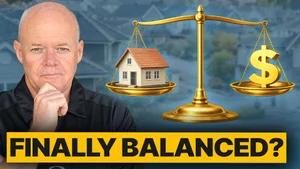If you’re confused by the news and headlines about the real estate market, you’re not alone!
Are home prices still going up or are they coming down?
Are we in a housing bubble, about to crash, or just returning to normal?
The only certainty in the real estate market currently seems to be the uncertainty of it.
My goal in this month’s real estate market update is to break it all down and share the latest data with you on what the markets doing now, what it’s expected to do in the coming months, and what it means to you if planning on buying or selling a home.
Watch the following video, or continue reading below, to learn more;
Without a doubt, the housing market has slowed and continues to cool from the record-setting pace we saw in the second half of 2020 and 2021.
While there are many that still believe we are heading for a crash (my thoughts on that can be found here), I don’t know if that feeling is based on wishful thinking or if they have access to information I don’t, because the data is showing us we are seeing a market that is returning to normal and stabilizing rather than bursting or crashing. That doesn’t mean we won’t see a correction, but more on that later.
This could obviously change based on what happens in the broader economy, and if it does, I will be the first to tell you about it. (Follow me on YouTube for weekly updates)
The two areas that I am going to focus on in this update are home prices and inventory.
Home Prices
Home prices are directly related to the balance, or imbalance, that exists between supply and demand.
We can all agree that the run-up in home prices we experienced over the past couple of years wasn’t sustainable, but just because prices went up quickly doesn’t automatically mean the real estate market is poised for a crash.
Buyer demand, which was strong prior to the pandemic, was strengthened even more by artificially low mortgage rates coupled with the onset of remote work.
When you consider that supply was already low, which I discuss in more detail below, prices had nowhere to go but up as multiple offers and bidding wars became the norm. There were simply more buyers than houses available.
While there are many that have compared the past couple of years to the mid-2000s, this is not the same thing.
Back then, even though we had plenty of supply, prices were increasing anyway, mainly due to predatory lending practices that created artificial demand. Fog a mirror, get a loan. The fact that you couldn’t afford the loan made no difference. After all, home prices will continue increasing forever, right🤔
A Correction, Not a Crash
While I don’t foresee a housing market crash, that doesn’t mean there won’t be a correction.
I know that sounds like a play on words, but let me explain.
Here in Frisco, home prices peaked in April 2022. Rapidly rising mortgage rates, coupled with high home prices, threw a bucket of ice water on buyer demand. Homes simply became unaffordable for many.
As a result, sellers that had to sell had no choice but to reduce their list price and new listings could no longer be listed above the price of the last home sold in the neighborhood. The median sales price in Frisco in August was 17% lower than the median sales price in April.
How can that not be the start of a crash?
Because the median sales price in August 2022 was still 14% higher than the median sales price in August 2021. As such, year-over-year home prices continue to increase.
Additionally, the number of price reductions we are seeing in the market and month-over-month sales price declines are falling into a more normal seasonal pattern and starting to stabilize (sales prices are always lower in the fall and winter compared to spring and early summer).
Here’s what one leading economist had to say about what we are seeing in the real estate market currently;
Mark Zandi, Chief Economist at Moody’s Analytics, normally one of the most conservative forecasters, doesn’t think significant price declines will be seen in the majority of the country;
The areas most susceptible to price declines are the areas that saw the largest price increases over the past couple of years - Boise, Austin, Las Vegas, etc.
CoreLogic, in their latest Home Price Insights Report, expects that home price appreciation will continue to moderate, but not go negative for the majority of the country;
For additional information on home prices in Frisco and Prosper check out this recent blog post.
Inventory
One of the reasons the experts are expecting home price appreciation to moderate, but not decline, is inventory, also known as supply.
As mentioned above, home prices, just like the price all of goods and services, are the direct result of the balance, or imbalance, between supply and demand. High demand with low supply means prices rise and vice-versa.
We’ve had a housing shortage in this country for over a decade. New home construction plummeted following the housing market crash and never fully recovered, yet new household formation has continued to grow.
There was a widely held expectation that resale inventory would increase this year as more homes came on the market as buyer demand declined, but that hasn’t happened.
Inventory has actually been falling faster than expected. While it’s true that we have more inventory than we did a year ago, we are still well below pre-pandemic inventory levels;
Declining resale inventory makes sense when you think about it.
If you own a home currently chances are you have built up a substantial amount of equity and have a fixed-rate mortgage somewhere near 3%. Unless you really have to move, why would you sell your existing home and trade in your current mortgage for a more expensive home and a mortgage rate closer to 6%?
There are exceptions, obviously, such as wanting to live in a specific neighborhood, or community, needing more space, job transfer, etc., but many homeowners who were just thinking of selling have decided to wait.
For Sellers
If you do actually need to sell, then here are a few things to keep in mind.
The days of listing your home for any price and receiving multiple offers within days of listing are over. It will take longer to sell and you will have to compete for buyers. Pricing your home based on the most recent sales in the neighborhood is no longer a good plan. I would suggest paying more attention to what other homes in the area are listed for and what homes have recently gone under contract. To increase your chances of a sale you will want to get ahead of the curve with pricing.
Buyers are also looking for the best overall value. If you have deferred maintenance or your home doesn’t show quite as well as it should, that isn’t going to work in the current market.
That being said, the current market does provide opportunities that have not been readily available over the past couple of years. You are now much more likely to be able to purchase a home contingent on the sale of your current home and even the new home builders are accepting contingencies again.
For Buyers
While homes are definitely less affordable than they were a year ago, there isn’t as much stress in the buying process as there was previously. You no longer have to compete against multiple offers and pay tens of thousands over the asking price. You no longer have to waive contingencies or appraisals and the asking price is the maximum you will need to pay, not the starting point.
In addition, the vast majority of new home builders, and some resale sellers, are offering incentives that can be used towards closing costs and/or buying down the mortgage interest rate.
Lower mortgage rates are something the new builders are aggressively pushing. One builder is currently offering a 30-year fixed rate mortgage of 3.99% on all inventory homes while another is offering a 2.99% rate in year 1, 3.99% in year 2, and 4.99% fixed for years 3 through 30.
Not sure if now is the right time to buy?
Each week I provide an updated market report that allows you to see, at a glance, how the market is trending. CLICK HERE to see the most recent Frisco report; (from that report you can search any city/zip code in the country)
Bottom Line
How the real estate market performs in the coming year will really depend on where you live.
The economy here in North Texas remains strong and the new home builders locally are quite bullish about the future. With low unemployment, strong job growth, and continued inbound migration (a new family moves to the DFW Metroplex every 3.2 minutes) it is estimated we need to build 50,000 new homes per year to keep up with current demand according to Beazer Homes.
While there are opportunities out there compared to the past couple of years, I realize now might not be the right time for everyone to make a move.
If you have questions, or a specific situation you would like to discuss in more detail, please Schedule a Free Call with me as I’m always happy to talk with you.











